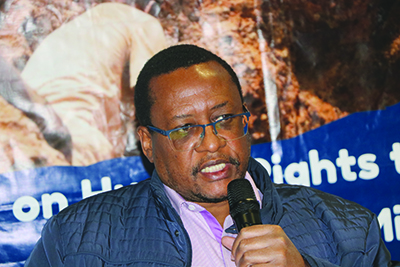By Thoboloko Ntšonyane
MASERU – The Southern African Development Community (SADC) is deeply concerned over high prevalence rates of Tuberculosis (TB) incidences amongst the Member States.
SADC Senior Programme Officer for TB and Communicable Disease Dr Charles Sandy said while the region had achieved the main Millennium Development Goals (MDGs) target which were succeeded by the Sustainable Development Goals (SDGs) in 2015, of halting and reversing TB incidence by 2015, there has been a slow decline recorded in TB incidence and deaths since the end of the MDGs era.
Lesotho had last week held a ‘Country-level stakeholder engagement workshop on domestication of the SADC operational plan on declaration on Tuberculosis (TB) in the Mining Sector (TIMS) in Southern Africa’.
He also highlighted that the region had recorded a low treatment coverage and treatment success rate relative to the set global targets.
He attributed some of these challenges to the outbreak of the COVID-19 pandemic in 2020 which had undermined the progress made on some key indicators.
The SADC Senior Programme Officer for TB and Communicable Disease said 12 out of the 16 SADC Member States are among the 75 percent with high global TB rates, TB/HIV, multidrug resistant tuberculosis (MDR), rifampicin-resistant (RR) MDR-RR burden countries.
Dr Sandy also noted that the mining sector has seen significant levels of cross-country migrations which about 40 percent Mozambique, Eswatini and Lesotho nationals work in South African mines.
“There is general[ly] poor cross border health referral systems, and mostly non-harmonized management practices,” he said adding that mining sector harbors high rates of TB, TB/HIV at least three times higher than in general population.
The SDG target 3.3 calls for an end of epidemics of AIDS, TB, malaria and combat hepatitis, water-borne diseases, neglected tropical diseases including other communicable diseases.
The Country TB Program Manager Dr Llang Maama said Lesotho is amongst the 30 high burden countries for TB and TB/HIV.
She said there is a need for concerted efforts to find the missing TB cases and TB screening campaigns in the Lesotho Correctional Service (LCS) facilities.
She indicated that the community education needs to be enhanced to instill positive knowledge and attitudes in the general population saying this could change the population practices and behaviors towards TB and boost the case finding exercises. She also touched on integrated TB/HIV/COVID-19 screening.
She said the TB high burden countries account for 86 percent of the estimated incident cases.
The East, Central and Southern African Health Community (ECSA-HC) ECSA-HC Communication and Advocacy Officer, a regional inter- governmental health organization that fosters and promotes regional cooperation in health, Justin Mahimbo said efforts have been made to address high burden of TB in mining, where in August 2012, the SADC Member States signed a declaration on TB in the mining sector, indicating five priority areas in TB, HIV, Silicosis and other occupational respiratory diseases.
Those he said include: actively looking for people with TB and treating them promptly; elimination of conditions leading to high TB rates in mines; improving TB treatment; actively seeking former mine workers who could have TB and creating a legal and regulatory framework that provides compensation for occupational diseases among miners and ex-miners.
Mahimbo pointed out that in response to declaration on TB in the mining sector, the Global Fund is supporting SADC Member States to address the high burden of TB in mining Sector and surrounding communities through the implementation of declaration on TB in the mining sector.
Of the successes recorded, the ECSA-HC Communication and Advocacy Officer said about 419,957 Mineworkers, Ex-mineworkers, their families and community have been screened for TB; more than 20 (civil society organisations) CSO’s were capacitated, 11 Occupational Health Service Centres have been established in eight SADC countries and handed over to host governments; four TB Screening Models were developed and more than four studies were undertaken.
Dr Sandy underscored that “renewed commitment and accelerated action in strengthening the national response measures for TB in mining is required urgently”.


